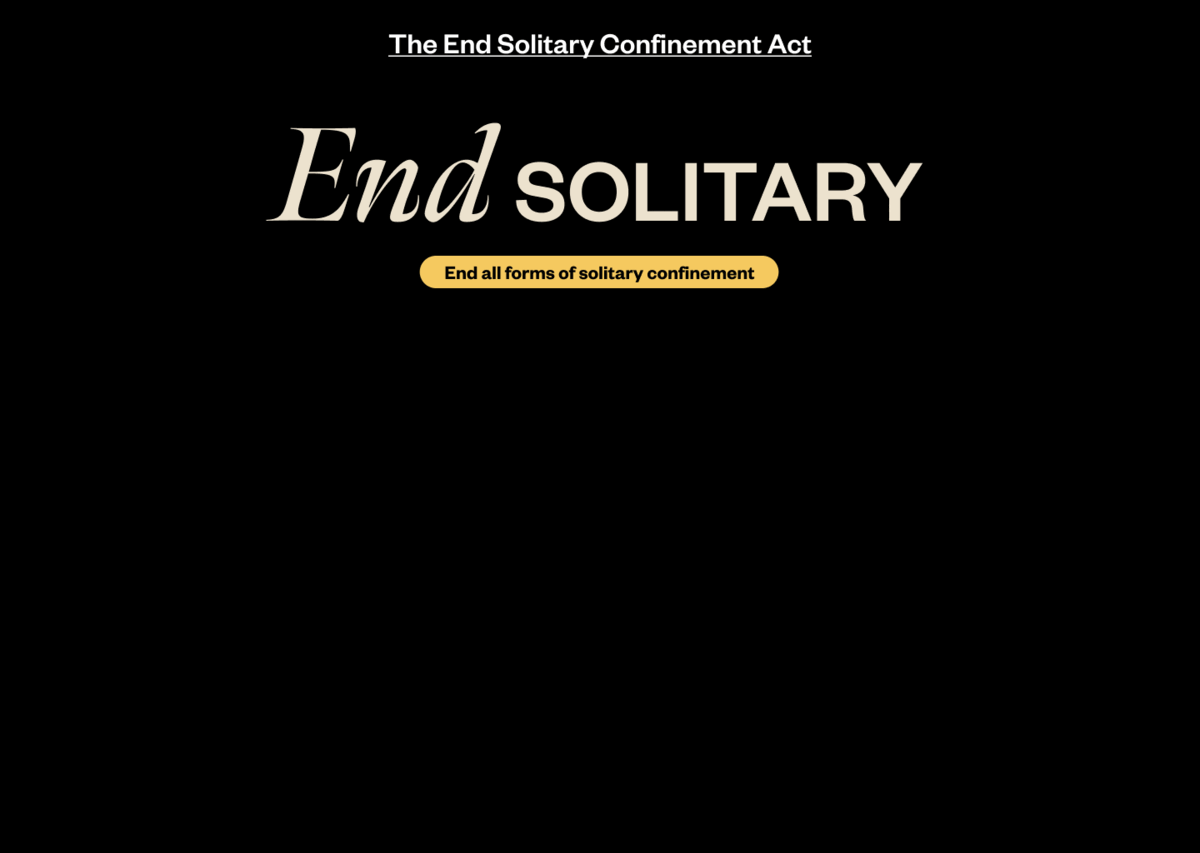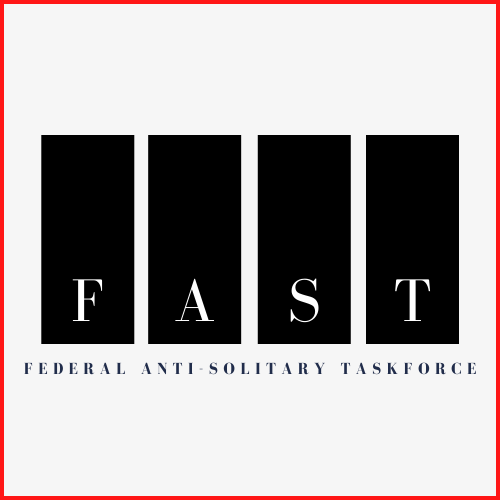
Our Mission
Ending Torture
Convened by leading nationwide experts on solitary, including the American Civil Liberties Union, Vera Institute of Justice, National Religious Campaign Against Torture, Unlock the Box Campaign, Center for Constitutional Rights, and the #HALTsolitary Campaign, the Federal Anti-Solitary Taskforce is working to fully end solitary confinement in federal prisons and detention facilities, and end solitary in states and localities as well.
The Taskforce is comprised of civil rights, human rights, faith, and health organizations and leaders, including people who have survived solitary confinement, people who have had family members in solitary confinement, and their allies.
Members of the Taskforce have been working to end solitary confinement across the country and have come together to push for an end to solitary confinement federally.
Recent Work
The Blueprint
The Bill
Solitary Cell drawing by Carnell Hunnicutt, Sr. (Northern Correction Institution – Supermax, Somers, CT)// Painting by Anonymous Solitary Survivor Drawing Alone: Making Art in Solitary Confinement and Art and Art Theraphy with the Imprisoned: re-Creating Identity
Relevant information
Press Links
Recent News
Survivor Voices
The Bill

My African Dream by Obie Weathers III, survivor of solitary confinement
Video courtesy of Unlock the Box. Illustrated image by unknown solitary survivor.
FAST Timeline
Joining Forces to End Torture
Oct 2020
Year Founded
Our seven organizations jointly created a taskforce with the purpose of ending solitary confinement at the federal level.
June 2021
The Federal Blueprint
On June 7, 2021 we released the first-ever Blueprint for Ending Solitary Confinement by the Federal Government. The document outlines how the United States government can use executive, administrative, and legislative action to end the torture of solitary confinement in federal custody.
July 2023
The End Solitary Confinement Act
The End Solitary Confinement Act will prohibit the use of solitary confinement, except for up to a max of four hours, and create safe alternatives to a common US practice understood across the world as a form or torture.
About Solitary
What Research Shows
Solitary is Torture
International human rights and health organizations, including The World Health Organization and the United Nations have roundly denounced the use of solitary confinement as a form of torture.
Psychological Harm
Solitary confinement is severe human, social, and sensory deprivation, causing mental, physical, and social deterioration; and often leads to causes psychosis, anxiety, depression, and heart disease, self-mutilation and death by suicide.
Counterproductive
Multiple studies and reports show solitary does not lead to safer prisons or communities; it causes more violence inside correctional facilities, a marked increase in mental illness, and increased harm to the communities where survivors are placed.
Alternatives
Multiple studies have found that facilities that employed alternative treatment diversion programs had significantly lower rates of prison infractions, inpatient mental health admissions and self-harm incidents than compared to use of solitary.
How It's Used
Many people believe solitary confinement is used for "the worst of the worst" violent offenses. However, studies show that most (up to 85%) of people in solitary are there for minor rule infractions indicating a widespread abuse of power by corrections officers.
Significant Bias
Solitary and other forms of restrictive housing and practices are disproportionately inflicted on Black people, Latinx people, Indigenous people, and other people of color, as well as transgender and gender non-conforming people, people with mental health needs, and young people.
Damage to Youth
30% of youth held in juvenile facilities report being held in solitary confinement for some period of time.Because their brains are still developing the psychological effects are great and often irreversible. In addition, youth in solitary are kept from educational opportunities and the ability to develop social skills.
Pervasiveness
Currently, more than 122,000 people are in solitary confinement in U.S. prisons and jails, not even counting immigration detention, youth confinement, or solitary by another name. In federal prisons alone, there are over 11,000 people locked in solitary on any given day, representing nearly 8% of the total federal prison population
What the experts say
A Cause Worth Fighting For
Video courtesy of Unlock the Box. Illustrated image by unknown solitary survivor.
how we can end solitary
The Blueprint
On June 7, 2021 the FAST coalition released the first-ever Blueprint for Ending Solitary Confinement by the Federal Government today. This document outlines how the United States government can use executive, administrative, and legislative action to end the torture of solitary confinement in federal custody, including in Bureau of Prisons facilities, U.S. Marshals Service facilities, and immigration detention.
Specifically, the released Blueprint calls for the U.S. government to:
- End all forms of solitary confinement in federal custody, other than brief lock-ins measured at most in hours to de-escalate emergency situations, or true medical quarantine in units overseen by medical staff;
- Ensure that all separation/alternatives to solitary, regardless of what they are called, involve access to full days out-of-cell (at least 14 hours per day) and meaningful programming and activities (at least 7 hours per day) without restraints and with at least several other people in group spaces conducive to meaningful human engagement;
- Enhance due process protections, using neutral decision-makers and representation at hearings; and
- Create oversight and enforcement mechanisms, including ensuring people wrongfully placed in solitary have legal recourse, as well as mandating data collection, independent oversight by an Ombudsperson, media, and community stakeholders, and incentives for states and localities to end solitary and create safer and more effective interventions.
We must take action
The Bill

Representative Cori Bush has introduced landmark legislation to stop torture, save lives, and improve safety for everyone.
The End Solitary Confinement Act will prohibit the use of solitary confinement, except for up to a max of four hours, and create safe alternatives to a common US practice understood across the world as a form or torture.
Support the movement
Take Action
THE END SOLITARY CONFINEMENT ACT
The current moment presents an opportunity for the federal government to truly lead the way by ending solitary confinement, other than in extreme circumstances and measured in hours not days, and create incentives for states and localities to do the same. It’s time to end torture and adopt evidence-based alternatives that are more humane and effective. Join us in taking action to eliminate solitary confinement once and for all.
Contact President Biden and your Congressional Representatives and demand an end to Solitary Confinement.
Send an email to your representatives with one click!
The Taskforce
Supporting Organizations
The Federal Anti-Solitary Taskforce is made up of seven nationwide experts on solitary confinement.

The Federal Anti-Solitary Taskforce is comprised of leading nationwide experts on solitary.
Get In Touch
About Us
Subscribe to our Newsletter
Copyright © 2023 Federal Anti-Solitary Taskforce










